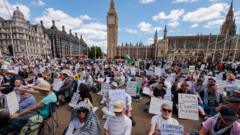How Did Palestine Action Protests Lead to Over 500 Arrests?

Understanding the Recent Arrests at the London Demonstration for Palestine Action
The recent demonstration in London supporting the banned group Palestine Action has sparked significant attention, not only due to the sheer number of arrests but also because of the implications regarding civil liberties and public dissent. A total of 532 arrests were made during this event, marking it as one of the largest protests since the group's proscription under the Terrorism Act. This article delves into the details of the arrests, the legal ramifications, and the broader implications for protests in the UK.
The Context of the Protests
On Saturday, demonstrators gathered at Parliament Square in Westminster to express their support for Palestine Action, a group that has faced a government ban since July. This proscription categorizes membership in or support for the group as a criminal offense under the Terrorism Act, which can lead to severe penalties, including up to 14 years in prison for offenders. The government’s decision to ban Palestine Action has been met with considerable controversy, raising questions about freedom of expression and the rights of protesters.
Details of the Arrests
According to the Metropolitan Police, the majority of the arrests—521—were made for displaying placards supporting Palestine Action during the demonstration. In addition to these, six individuals were arrested for assaulting police officers, two for breaching Public Order Act conditions, one for obstructing a constable, and one for a racially aggravated public order offense. This highlights the tension between law enforcement and protesters, particularly when it comes to expressing dissent against government policies.
The Role of the Metropolitan Police
The Metropolitan Police have stated that they are committed to enforcing the law while ensuring public safety. In the wake of the protests, their counter-terrorism team has begun working on compiling case files to bring charges against those arrested for supporting Palestine Action. This proactive approach underscores the police's broader strategy of tackling what they consider threats to public order and national security.
The Average Age of Those Arrested
Interestingly, the average age of those arrested during the demonstration was reported to be 54 years old. This statistic challenges common perceptions of protest demographics, which often center around younger individuals. It suggests that support for Palestine Action spans multiple age groups, indicating a broader societal concern regarding the issues the group represents.
The Legal Framework Surrounding Protests
Understanding the legal landscape for protests in the UK is essential for grasping the implications of these recent events. The right to peaceful assembly is enshrined in law, but it is not absolute. The Public Order Act provides police with the authority to manage protests, but recent amendments and government responses to protests have raised concerns about the extent of these powers.
Public Order Act and Its Implications
The Public Order Act allows the police to impose conditions on protests, including limiting their duration or location. Breaching these conditions can result in arrest. Critics argue that this creates a chilling effect on free speech and peaceful assembly. The arrests made at the Palestine Action demonstration may serve as a case study in how these laws are applied and enforced.
Government Response to Protests
The UK government’s approach to protests, particularly those that involve groups like Palestine Action, reflects a growing trend towards increased surveillance and policing of dissent. The decision to classify the group as a terrorist organization has been met with backlash from human rights advocates, who argue that it undermines democratic freedoms.
Public Reaction and Future Implications
The response from the public and various organizations to the arrests has been mixed. Some have voiced support for the police’s actions as necessary for maintaining public order, while others have condemned the arrests as an infringement on civil liberties. This division highlights the ongoing debate about the balance between security and freedom in modern society.
Impact on Future Protests
As the situation unfolds, the implications for future protests are significant. The large number of arrests may deter some individuals from participating in demonstrations, fearing legal consequences. However, it may also galvanize support for Palestine Action and similar groups, as public awareness of the issue grows. The government’s response will likely shape the landscape of protest in the UK for years to come.
Conclusion: A Call for Reflection
The events surrounding the demonstration in support of Palestine Action raise critical questions about the nature of protest, civil liberties, and government authority. As the legal proceedings against those arrested progress, the societal implications of these actions will continue to unfold. It is essential for citizens to remain engaged and informed about their rights and the evolving legal landscape surrounding public demonstrations.
FAQs
What is the significance of the arrests made during the demonstration?
The arrests serve as a crucial indicator of the government's stance on dissent and the enforcement of laws surrounding protests, particularly in relation to groups considered extremist.
How does the Public Order Act impact protests in the UK?
The Public Order Act gives police the power to impose conditions on protests, which can lead to arrests if those conditions are breached, potentially impacting the freedom of assembly.
What are the potential consequences for those arrested?
Those arrested could face legal charges ranging from minor offenses to serious allegations under the Terrorism Act, with significant penalties depending on the nature of the charges.
As we reflect on these recent events, it is crucial to consider the implications for democracy and freedom of expression. How do you believe the balance between security and civil liberties should be maintained in future protests? #ProtestRights #CivilLiberties #PalestineAction
Published: 2025-08-10 15:14:04 | Category: technology



